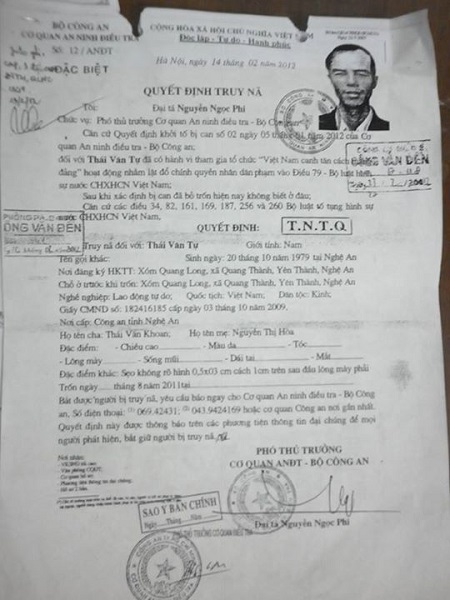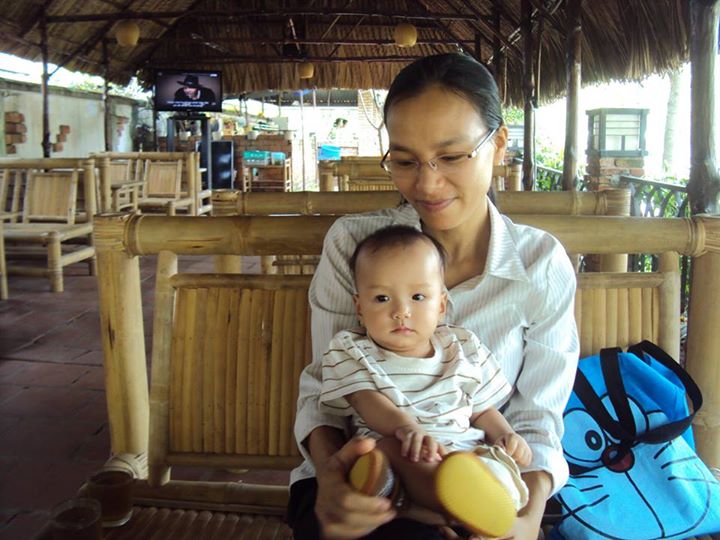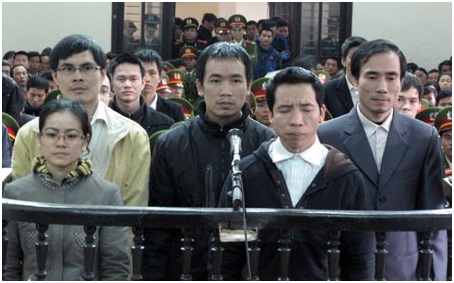Thương Người Em Nhỏ, Bây Giờ ở Đâu?






Where Are You Now, Beloved Little Sister?
Could it be that she was the victim of an attempt to stop people from communicating, a few years ago, before the release of Government Decree No. CP 72* ?
Teacher Nguyễn Thị Bích Hạnh, when lecturing to her students from the teacher’s platform** suggested that they make an effort to search web to search for information that might supplement the topics they are learning. And instantaneously, the propaganda and educational establishment within the government erupted in an angry chorus. The Dân Trí (“people’s Intelligence”) newspaper condemned her action and accused her of:
“…severely violating through distortions the teacher’s code of ethics; propagandizing contents contrary to the Government’s policy and official positions from a teacher’s platform; distorting the Party’s line and the Government’s legal policies and viewpoints; violating the point of view and the content of educational materials by accessing the web to research and update these materials; disseminating reactionary and anti-educational web pages…”
Teacher Bích Hạnh was fired from her job, and after a while, no one mentioned her anymore.
One sunny afternoon in 2010, I came with Lê Quốc Quân to the village of Yên Thành in the province of Nghệ An to attend the annual feast that commemorate the day his father passed away. Quân took me on a guided tour of his village, and when we walked by a house that seemed to be crouching at a corner of the village, he stopped and looked inside the house. Peering through a thin bamboo hedge, I saw cabbage and some other vegetable growing on a small patch in front yard of the house. Quân said:
– Do you know teacher Bích Hạnh?
– Yeah, I have heard of her, doesn’t she live in Quảng Nam province?
Quân shook his head.
– No, this is her house, she taught in Quảng Nam, but because she told her students to look for information on the web, they fired her from her teaching job, so she had to return to her home, and now she couldn’t find any work anywhere.
Quân pushed open the bamboo gate and we walked into the house. The roof of the how is very low and its floor is just tamped earth. In the middle of the house were a table and some chairs. Paint was peeling off these old and rickety pieces of furniture. At a far corner of the house stood a table. On it was an ancient desktop computer of uncertain vintage. A small bookcase stood next to the table. Curious, I walked toward the table and looked at the papers that were lying around on it. These were notes jotted down by someone who was writing about some educational program.
Even though no one was home, the house gate was open as it is customarily done in the countryside; moreover, this house really had nothing worth stealing. We sat on the chairs in the middle of the house for a little while, and then teacher Bích Hạnh walked in, crossing the gate and then going through the front yard. She had a large basket on one hand and a sickle in the other.
Quân greeted her, the teacher welcomed us, went in the kitchen to put away her tools, and then came back to offer and pour some water for us. We asked her how she was doing, she told us that her job search was still unsuccessful, that none of places she applied to accepted her, and so for the time being she was back home to work the rice fields and the vegetable patches with her mother.
I looked at her, saw how skinny and frail she was, and in my mind’s eyes I saw a determined woman who successfully overcame any and all hardships to pursue her studies until she earned a Master degree so as to achieve her dream of teaching from a teacher’s platform, and the calamities that befell her just a few days after she started teaching. The dream was shattered, the hardships endured were for naught. And so she went back to her mother, to work the rice fields, to cultivate the vegetable patches, so as to eke out a living on a day to day basis.
And so flowed the river of life. I did not get to meet her often. But once in a while, I would return to the village with my friend Quân. On these return trips, I would talk to the neighbors, mention her name as the situation allowed, and I would learn that she was still staying at her mother’s home, still working the fields, and still writing some book.
Then a rebellion against the government and involving a dozen or so young people erupted in the province of Nghệ An***. Arrests followed. I followed the news on the identity of the people who were arrested, their personal situations, and their families. I found out that they came from all over the province of Nghệ An****. Some hailed from the remote areas near the border with Laos. Others came from areas bordering the province of Thanh Hóa. There were hundreds of kilometers from one end of the province of Nghệ An to the other. Riding my rickety motorbike, I went to the home of each one of them and listened to their stories as told by their family members. Some of them had three year old toddlers, and babies still in the cradle,. Others were about to get married,, or were taking care of an aging mother. Yet others were still in school… I tried to understand the difficult situations their families were in, so that I can get friends and concerned citizens to help and support them. I thought that securing such help and support was the least I could do for them.
But, I now realized that I left out one family. That family is teacher Bích Hạnh’s, as I found out only not so long ago. It so happened that during the aforementioned rebellion, one man was able to avoid capture*****. He went into hiding, became a fugitive, and the Investigative Division of the Ministry of Public Security had issued an arrest warrant against him.

The name of that fugitive is Thái Văn Tự. Because he was able to flee and avoid capture, the investigations conducted by the Ministry of Public Security came to a dead end as information sources dried up. And now no one knows where Thái Văn Tự is.
Thái Văn Tự is the husband of teacher Bích Hạnh. I don’t know when they got married, even though I did meet him several times before. Trained as a maritime engineer, he had a good and well paying job. But he left it all to follow a road that he and many other men and women from the same province had chosen. That road is the one that they hope will some day endow the country with freedom, democracy, and compassion.
But for now, Thái Văn Tự is nowhere to be found, like a bird in the sky, or a fish in the water. His friends, the ones who were jailed, are those being talked about. But no one, including his wife and child, knows where Thái Văn Tự went to seek refuge.
In the meantime, Teacher Bích Hạnh, who had become pregnant, gave birth to a son while her husband was a fugitive hiding from an arrest warrant. And now, the house with the very low roof, the sparse vegetable patches, and the rice fields that wither under the implacable sun of Central Vietnam, all of these have to shelter and support one more of God’s creatures, a very little boy.
Behind those who engage in the struggles are lives interrupted, aging mothers, plain and trusting wives, and young children. They are all fated to endure the same hardships and difficulties that would befell those who engaged in the struggle.
But the country is never lacking in people who are willing to take on the struggle. As soon as one group gets sent to prison, another rises to pick up and continue the fight for freedom, justice, and equality for all, and independence and sovereignty for the country and her people. And these people are more than prepared and willing to face the harsh regime that is always ready to throw them in prison or subdue them by all means necessary.
It has been several years now that teacher Bích Hạnh has been trying to stay alive and care for her mother and her son by working the rice fields and the vegetable patches. Her life as a rice field worker and subsistence vegetable grower is extremely hard, yet no one ever heard her complain about the hardships that she endured and overcame. Oh how much I wish to say “thank you” to each and everyone of you, the frail and skinny and haggard looking women who rise so early to quietly work in the rice fields and tend the vegetable patches to scrape out a living, to raise the children, and to do so days after days without a single complaint, without ever feeling the need to utter even a simple explanation!

I don’t know when teacher Bích Hạnh will see her husband again and her son, his father, for the first time. I don’t know when they will be reunited. I don’t know when they will be able to resume life as a normal family just like any other family. But this much I know: even if the road ahead is very hazy and uncertain, teacher Nguyễn Thị Bích Hạnh will be full of life and energy. She will not let anything deter or discourage her from facing head-on the daily struggle to feed, clothe, and shelter what is left of her family: her baby boy, her mother, and herself. She will do what must be done, just as the relatives of those who engaged in the struggle did and are doing now.
And so she sails on, as frail and as graceful as a crane finding her way home above the stormy waters of a cruel world. And so I pray. I pray that she and her son shall have the fortitude to overcome the hardship and difficulties that come their way, and that these will come to an end in the future.
English version/translation by Chấn Minh
August 9, 2013
SOURCE: Thương Người Em Nhỏ, Bây Giờ ở Đâu?
Người Buôn Gió (“The Wind Merchant”) Tuesday, August 3, 2013
http://nguoibuongio1972.blogspot.com/2013/08/thuong-nguoi-em-nho-bay-gio-o-au.html
Notes
* The terms “Decree 72” refer to a Government Decree No. 72 of July 30, 2013. The decree aims to regulate the use of the Internet and specifically forbids individuals and bloggers to share news and information on current events using the Internet and social medias. The decree also requires foreign internet companies to keep a server inside Vietnam. In a statement on Tuesday August 6, 2013, the US embassy in Hanoi said that it was “deeply concerned by the decree’s provisions that appear to limit the types of information individuals can share via personal social media accounts and on websites”. Reporters Without Borders said that “If the decree takes effect, Vietnamese will be permanently deprived of the independent and outspoken information that normally circulates in blogs and forums”. Read more from the BBC here: http://www.bbc.co.uk/news/world-asia-23584431
** Teacher’s platform – Vietnamese tradition dictates that a teacher’s desk is placed on a large raised platform that also runs along the blackboards, and that the teacher will always lecture standing on that platform. To “teach from a teacher’s platform” is a Vietnamese locution that confers to the teacher qualification and authority.
*** The government of Vietnam alleged that Mr. Thái Văn Tự and fifteen other men and one woman – Hồ Đức Hòa, 39; Đặng Xuân Diệu, 34; Lê Văn Sơn, 28; Nguyễn Đặng Minh Mẫn, 28; Nguyễn Đình Cương, 32; ; Đặng Ngọc Minh, 58; Nguyễn Văn Duyệt, 33; Nguyễn Văn Oai, 32; Nông Hùng Anh, 30; Nguyễn Xuân Anh, 31; Hồ Văn Oanh, 28; Thái Văn Dung, 25; Trần Minh Nhật, 25; Nguyễn Đặng Vĩnh Phúc, 33; Nguyễn Xuân Kim, and Lê Sỹ Sáng conspired to overthrow the government. What they actually might have done was to attend one or several seminars on non-violent resistance offered by Viêt Tân, a declared non-violent US-based Vietnamese political party. Fourteen of the above named people were caught and put on trial on January 7-9, 2013. They received sentences ranging from 3 years suspension to 14 years in prison. Most got 4 years in prison. All will be placed under administrative house arrest for 3 to 5 years upon their release. Below is an uncaptioned photo of some of the accused at their trial on January 8-9, 2013. On the photo, pay attention to the tall and first man in the white shirt and dark coat from the right. He bears a striking resemblance to the man pictured in the arrest warrant shown in this story. He could be Mr. Thái Văn Dung, 25, and a likely brother of Mr. Thái Văn Tự as they share the same family name.

**** Actually, not all “rebels” hailed from the province of Nghệ An: two who came from the province of Trà Vinh, one from the province of Thanh Hoá, and one from the province of Lâm Đồng.
***** The author Người Buôn Gió stated that one man, Mr. Thái Văn Tự, teacher Nguyễn Thị Bích Hạnh’s husband, escaped and avoided capture. Actually, according to the account of the trial as published at the Ministry of Public Security website, three men were able to avoid capture and as of this writing they are still at large. These men are: Thái Xuân Tự, Nguyễn Xuân Kim, and Lê Sỹ Sáng. For our readers who read Vietnamese, below is link to the story posted at by the Ministry of Public Security’s website, CANDOline: http://www.cand.com.vn/vi-VN/phapluat/2013/1/189454.cand (accessed on August 9, 2013).














































